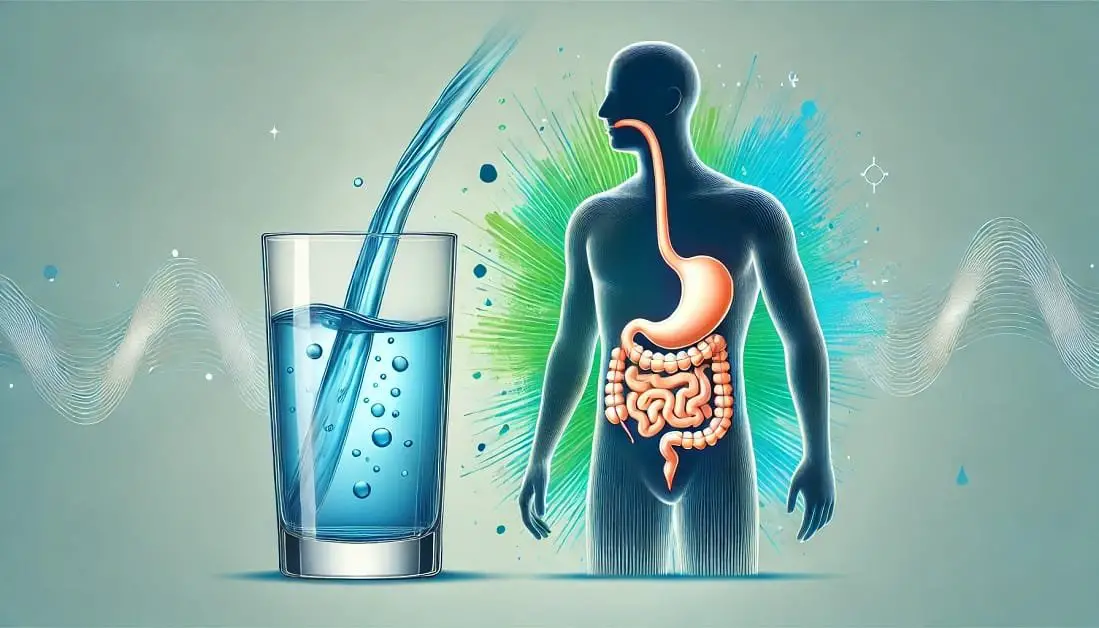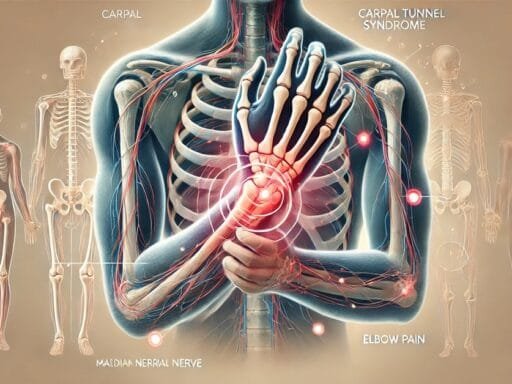1. Introduction
Water is one of the most essential elements for maintaining life. It plays a crucial role in regulating body temperature, aiding digestion, supporting kidney function, and flushing out toxins. Proper hydration is often hailed as a cornerstone of good health, making it surprising when something so beneficial can cause discomfort for some individuals. For those affected, drinking water may not feel as refreshing as it should—instead, it can lead to an unsettling feeling of nausea.
If you’ve ever found yourself thinking, “Why does drinking water make me nauseous?” you’re not alone. This seemingly strange reaction could stem from several underlying hydration issues or even conditions like water-related nausea or water intolerance. Factors like how you drink water, its temperature, or even hidden health conditions could all play a role.
This blog aims to address these concerns head-on. We’ll explore the various reasons why drinking water makes you nauseous, examine proven causes, provide practical solutions, and answer frequently asked questions. By the end, you’ll have the knowledge to stay hydrated comfortably and confidently, ensuring water enhances your health without causing unnecessary discomfort.
Table of Contents
- 1. Introduction
- 2. Understanding Why Drinking Water Makes You Nauseous
- 3. Proven Causes of Nausea After Drinking Water
- 4. Proven Solutions to Combat Nausea
- 5. Frequently Asked Questions (FAQs)
- 6. Conclusion
2. Understanding Why Drinking Water Makes You Nauseous
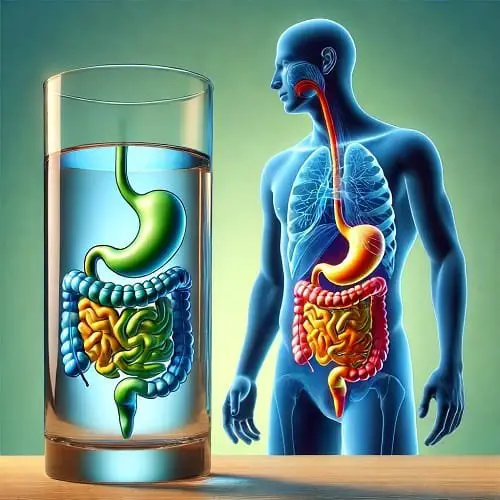
Water is often considered a universal remedy for various health issues, yet for some individuals, drinking it can trigger discomfort. To understand why drinking water makes you nauseous, it’s essential to look at the interaction between the digestive system and water consumption habits. This section explores how the stomach processes water, potential triggers of nausea, and underlying health conditions that could contribute to the issue.
2.1. The Role of the Stomach and Digestive System
The stomach is designed to handle a variety of fluids and foods, but sudden or excessive intake of water can disrupt its natural balance. When you drink water quickly or in large quantities, the stomach may struggle to process it efficiently, leading to feelings of discomfort or even nausea. Individuals with stomach sensitivity are particularly prone to such reactions.
Common symptoms associated with water-induced nausea include a heavy or bloated sensation, mild queasiness, or even a gag reflex. These reactions often occur when water enters an empty stomach or when it’s consumed inappropriately, such as during intense physical activity. The stomach’s reaction to sudden water intake is a significant reason why some people report, “drinking water makes you nauseous.”
2.2. Potential Triggers of Nausea
Several factors related to how and when you consume water can trigger nausea:
- Water Temperature Effects: The temperature of the water you drink can play a critical role in how your body reacts. Cold water, for example, may shock the stomach lining, causing discomfort, especially in individuals with sensitive digestion. Conversely, warm water is generally easier on the stomach and less likely to cause issues.
- Drinking Water on an Empty Stomach: Consuming water first thing in the morning or on an empty stomach can sometimes lead to nausea. This is because an empty stomach is more sensitive to rapid changes, particularly when large amounts of water are introduced at once.
- Overhydration and Rapid Intake: Drinking too much water too quickly can overwhelm your stomach and even dilute essential electrolytes in your bloodstream. This can cause a feeling of nausea and, in extreme cases, lead to water intoxication.
These water consumption habits highlight the importance of understanding how to drink water in a way that supports, rather than disrupts, the digestive process.
2.3. Hidden Health Conditions
In some cases, nausea after drinking water might be a symptom of an underlying health condition:
- Acid Reflux or GERD: Individuals with gastroesophageal reflux disease (GERD) may experience nausea after drinking water. Water can temporarily increase stomach acid levels, exacerbating reflux symptoms.
- Gastroparesis: This condition, where the stomach’s ability to empty itself is slowed, can also make it difficult to process water effectively. People with gastroparesis often report feelings of bloating or nausea after consuming even small amounts of fluid.
- Water Intoxication or Overhydration: Although rare, drinking excessive amounts of water can dilute sodium levels in the blood, leading to hyponatremia. This condition causes nausea, confusion, and in severe cases, more critical health complications.
By understanding these potential health-related triggers, you can better identify the root cause of why drinking water makes you nauseous and take appropriate steps to address the issue.
3. Proven Causes of Nausea After Drinking Water
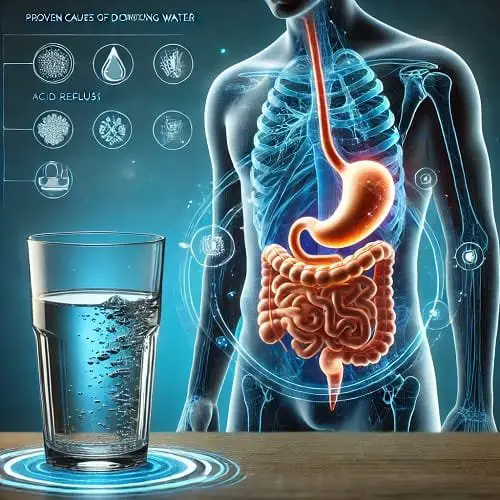
While drinking water is typically associated with better health, for some, it can cause unexpected discomfort. If you’ve ever thought, “Why does drinking water make me nauseous?” the answer often lies in a mix of physiological, environmental, and lifestyle factors. In this section, we’ll explore the proven causes of water-induced nausea, focusing on digestive disorders, overhydration, contaminated water, and other underlying triggers. Identifying these causes can help you address the discomfort effectively.
3.1. Digestive Disorders
Digestive health is a key factor in how your body processes water. Any disruptions in the digestive system can lead to discomfort and nausea. Let’s look at some common nausea causes linked to digestion.
- Acid Reflux or GERD: Individuals with GERD may experience nausea when drinking water, particularly if consumed in large amounts or on an empty stomach. This is because water can temporarily increase stomach acid levels, intensifying reflux symptoms.
- Irritable Bowel Syndrome (IBS): IBS is often associated with a sensitive stomach that reacts strongly to sudden water intake. For those with IBS, water consumption can lead to bloating, queasiness, or other digestive discomforts.
- Other Digestive Issues: Conditions like gastritis or ulcers, which involve inflammation of the stomach lining, can also worsen with rapid water intake. These issues make it clear why drinking water makes you nauseous in certain circumstances.
3.2. Overhydration and Its Effects
Although staying hydrated is crucial, overhydration can lead to serious hydration challenges, including nausea.
- Electrolyte Imbalance: Drinking excessive water can dilute essential electrolytes like sodium in your bloodstream, leading to a condition called hyponatremia. This imbalance can cause nausea, headaches, fatigue, and confusion. It’s a common issue for athletes or those who consume water excessively without balancing electrolytes.
- Signs of Overhydration: Besides nausea, overhydration symptoms include muscle cramps, swelling, and a heavy or bloated feeling. These signs are key indicators of why drinking water makes you nauseous after consuming too much too quickly.
3.3. Contaminated or Poor-Quality Water
The quality of the water you drink can also significantly impact your experience. Poor or contaminated water often causes drinking water problems that lead to nausea.
- Impurities and Contaminants: Contaminated water containing bacteria, viruses, or harmful chemicals like chlorine or lead can irritate the digestive system. These contaminants not only cause nausea but may also lead to more severe health issues.
- Ensuring Safe Drinking Water: To avoid discomfort, use a high-quality water filter, boil tap water when necessary, or rely on bottled water from trusted brands. Testing your home’s water supply for potential contaminants is another proactive step to ensure safety.
3.4. Other Causes
Other factors, beyond digestive issues and water quality, can also trigger nausea when drinking water.
- Sensitivity to Minerals in Water: Hard water, which contains high levels of calcium and magnesium, can be difficult for some individuals to digest. This sensitivity is often overlooked but may explain why drinking water makes you nauseous under specific conditions.
- Psychological Triggers: Stress and anxiety can amplify physical reactions, including nausea. For some people, the thought of drinking water under stressful conditions might exacerbate their symptoms.
- Medical Conditions: Conditions such as migraines or neurological disorders can also make individuals more susceptible to nausea when drinking water. These less obvious health-related triggers often require medical attention.
By addressing these proven causes—from digestive issues to hydration challenges—you can better understand why drinking water makes you nauseous and take steps toward a more comfortable hydration routine. Pinpointing the specific cause ensures that water becomes a source of health, not discomfort.
ALSO READ
Dealing with Achilles Pain After Running: Common Causes, Prevention Tips, and Effective Remedies
Gastrocnemius Pain After Running: Why It Happens and How to Treat It
4. Proven Solutions to Combat Nausea
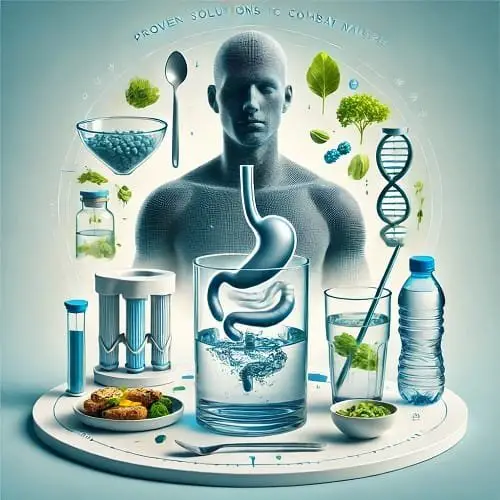
Feeling nauseous after drinking water can be frustrating, especially when hydration is essential for health. If you’ve wondered why drinking water makes you nauseous, the good news is that there are actionable steps to help. By adjusting your habits, improving water quality, addressing health concerns, and balancing electrolytes, you can avoid discomfort and stay hydrated with ease. Here are some nausea remedies that target the root causes of water-related nausea.
4.1. Adjusting Your Drinking Habits
Simple changes in how you consume water can make a significant difference in alleviating nausea.
- Sip Water Slowly Instead of Gulping It: Rapidly drinking large amounts of water can overwhelm your stomach and lead to discomfort. Instead, sip water gradually throughout the day to improve your hydration experience.
- Avoid Drinking Water Immediately Before or After Meals: Consuming water too close to mealtimes can disrupt digestion, causing bloating and nausea. Allow at least 30 minutes between meals and water intake to avoid this issue.
- Opt for Lukewarm or Room-Temperature Water: Water temperature can impact digestion and comfort. Cold water may shock your stomach lining, while lukewarm water is gentler and less likely to trigger nausea. This is a simple but effective nausea remedy for those with sensitive stomachs.
Adjusting these water consumption tips can significantly reduce the likelihood of feeling nauseous after drinking water.
4.2. Enhancing Water Quality
The quality of the water you drink plays a critical role in avoiding nausea. Contaminated or poor-quality water often exacerbates digestive discomfort.
- Use Filtered or Purified Water: Invest in a high-quality water filtration system to remove impurities such as chlorine, bacteria, or heavy metals. This not only improves taste but also reduces the likelihood of nausea caused by contaminants.
- Testing for Contaminants in Local Water Supply: Regularly test your home’s water for contaminants to ensure it’s safe for consumption. If your water source is problematic, consider boiling water or switching to bottled options from trusted sources.
Focusing on safe water practices ensures that the water you consume supports your health rather than triggering discomfort.
4.3. Addressing Underlying Health Conditions
Persistent nausea when drinking water may point to underlying health issues that require attention. Taking proactive steps to address these concerns can significantly improve your quality of life.
- Consult a Healthcare Provider for Persistent Nausea: If discomfort continues despite changes to your water habits, seek medical advice. A professional can identify conditions such as GERD, IBS, or gastroparesis that might be causing your symptoms.
- Treatments for GERD or IBS That Help Reduce Symptoms: Medications or dietary adjustments recommended by your doctor can help manage reflux or other digestive conditions. These treatments not only improve digestive health but also allow you to consume water comfortably.
Addressing the root cause of your discomfort is a critical step in overcoming the challenge of why drinking water makes you nauseous.
4.4. Electrolyte Balance and Nutrition
Hydration isn’t just about water—it also involves maintaining a balance of essential nutrients in your body.
- Incorporate Electrolytes into Water Consumption: Adding electrolytes to your water, especially after intense exercise or illness, can help prevent nausea caused by imbalances. This is especially important for avoiding overhydration-related discomfort.
- Eating Small Snacks When Drinking Water on an Empty Stomach: Consuming water on an empty stomach can sometimes lead to nausea. Pairing water with a light snack helps stabilize your digestive system and prevents this reaction.
These strategies not only address hydration challenges but also ensure your body remains balanced and nourished.
By implementing these proven solutions, you can prevent the discomfort of nausea while staying properly hydrated. Whether it’s adjusting how you drink water, improving its quality, addressing health conditions, or focusing on electrolytes, these steps provide comprehensive answers to why drinking water makes you nauseous. With consistent effort, water can once again become a refreshing and essential part of your daily routine.
5. Frequently Asked Questions (FAQs)
Many people experience discomfort when drinking water and wonder about the reasons behind it. Here are answers to some common questions about water-induced nausea, along with hydration tips to help you feel better.
Q: Why do I feel nauseous after drinking water in the morning?
Drinking water on an empty stomach in the morning can overwhelm your digestive system, especially if you have a sensitive stomach. This could explain why drinking water makes you nauseous. Sipping water slowly and pairing it with a small snack can reduce discomfort.
Q: Can the temperature of water cause nausea?
Yes, water temperature plays a role. Drinking cold water can shock the stomach lining, triggering discomfort. Opting for lukewarm or room-temperature water can help avoid water-induced nausea.
Q: Is there a link between water quality and nausea?
Absolutely. Contaminants in water, such as chlorine or bacteria, can irritate your digestive system and may explain why drinking water makes you nauseous. Using a water filter or drinking bottled water from a trusted source can reduce this risk.
Q: How can I improve hydration without feeling sick?
To avoid nausea, sip water throughout the day instead of gulping it. Adding electrolytes or drinking water at room temperature are simple adjustments that can enhance hydration.
Q: Should I see a doctor if nausea persists?
Yes, if you continue to feel nauseous despite making changes, consult a healthcare provider. Persistent nausea after drinking water might indicate underlying causes of nausea, such as GERD or other medical conditions.
6. Conclusion
Drinking water is crucial for maintaining health, but for some, it can unexpectedly cause nausea. Understanding why drinking water makes you nauseous involves identifying potential triggers such as digestive disorders, overhydration, and water quality issues. Fortunately, with the right approach, these challenges can be addressed.Implementing solutions like adjusting water temperature, improving drinking habits, and focusing on hydration advice tailored to your needs can help resolve nausea effectively. Additionally, ensuring water quality and consulting a healthcare provider for persistent issues are vital steps toward long-term comfort.

